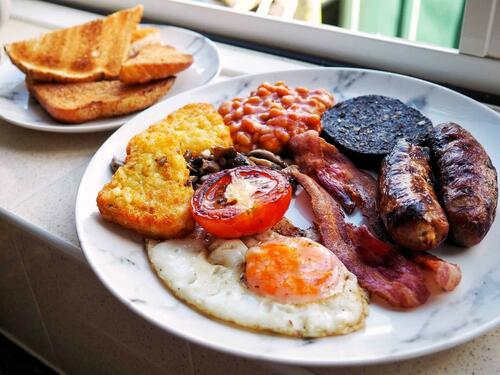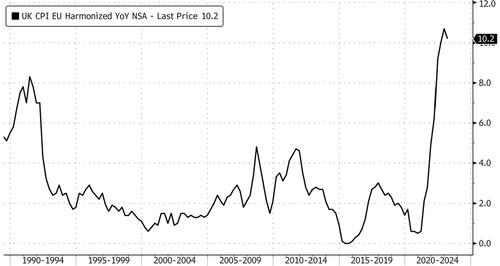
In March, UK inflation continued to hover in the double-digit range as households grappled with the persistently high cost of living. Among the various expenses challenging British consumers' wallets, the price of an English breakfast has notably soared.
Economic data from the Office for National Statistics showed the consumer price index last month rose by an annual 10.1%, above a consensus forecast of 9.8%. This is a slight dip from 10.4% in February and still at four-decade highs.
Diving deeper into the report, we find the ingredient costs to make a traditional English breakfast are up a whopping 23% in March from last year. This is the most significant increase since Bloomberg created the Breakfast Index, which tracks prices of sausage, bacon, eggs, bread, butter, tomatoes, mushrooms, milk, tea, and coffee last June.
The Breakfast Index provides insight into shoppers' hardships at the grocery store.
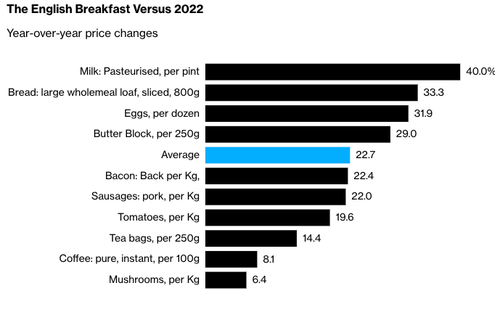
"Overall prices are still increasing at their highest level for over a decade, as manufacturers continue to pass on their costs through the supply chain to end customers," said Lisa Hooker, the industry leader for consumer markets at PricewaterhouseCoopers LLP.
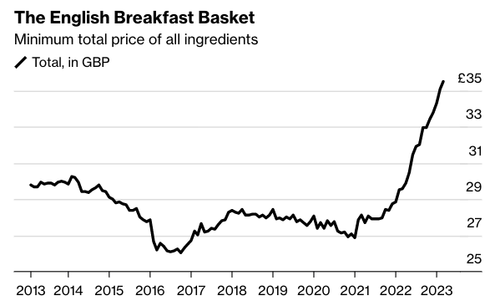
There is good news for consumers. Monthly changes some components in the Breakfast Index are decelerating.
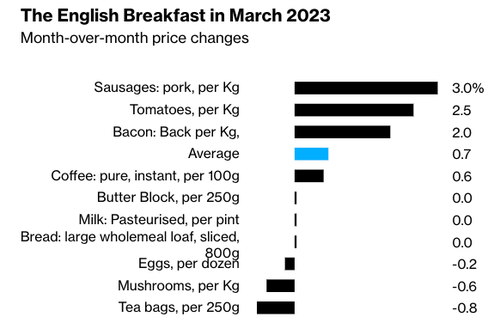
"With food price inflation likely to slow in the coming months as we enter the UK growing season, we expect wider inflation will continue to ease," said Helen Dickinson, chief executive of the British Retail Consortium.
Meanwhile, the former chief economist of the Bank of England, Andy Haldane, who left the Bank in 2021 to lead the Royal Society of Arts think tank, forecasted that inflation would fall rapidly in the coming months.
The bad news is that persistently high food inflation might cause further labor actions by unions in the UK and other European countries throughout the summer.
In March, UK inflation continued to hover in the double-digit range as households grappled with the persistently high cost of living. Among the various expenses challenging British consumers’ wallets, the price of an English breakfast has notably soared.
Economic data from the Office for National Statistics showed the consumer price index last month rose by an annual 10.1%, above a consensus forecast of 9.8%. This is a slight dip from 10.4% in February and still at four-decade highs.
Diving deeper into the report, we find the ingredient costs to make a traditional English breakfast are up a whopping 23% in March from last year. This is the most significant increase since Bloomberg created the Breakfast Index, which tracks prices of sausage, bacon, eggs, bread, butter, tomatoes, mushrooms, milk, tea, and coffee last June.
The Breakfast Index provides insight into shoppers’ hardships at the grocery store.

“Overall prices are still increasing at their highest level for over a decade, as manufacturers continue to pass on their costs through the supply chain to end customers,” said Lisa Hooker, the industry leader for consumer markets at PricewaterhouseCoopers LLP.

There is good news for consumers. Monthly changes some components in the Breakfast Index are decelerating.

“With food price inflation likely to slow in the coming months as we enter the UK growing season, we expect wider inflation will continue to ease,” said Helen Dickinson, chief executive of the British Retail Consortium.
Meanwhile, the former chief economist of the Bank of England, Andy Haldane, who left the Bank in 2021 to lead the Royal Society of Arts think tank, forecasted that inflation would fall rapidly in the coming months.
The bad news is that persistently high food inflation might cause further labor actions by unions in the UK and other European countries throughout the summer.
Loading…
